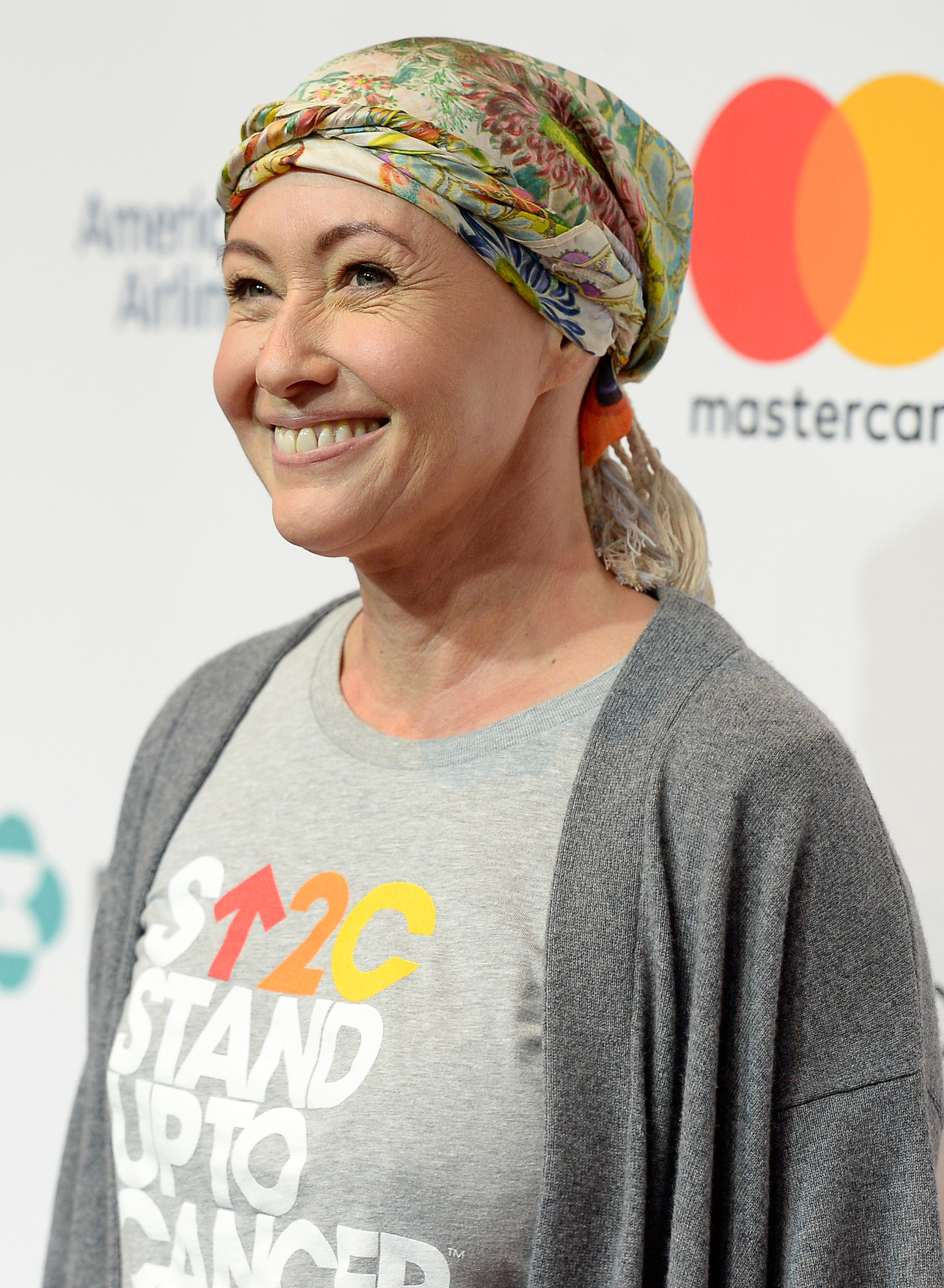Shannen Doherty Is 'Just Going With The Flow'
- Despite continuing to battle stage four (metastatic) breast cancer battle and her divorce, Shannen Doherty, 52, continues to look at life in an optimistic way.
- Doherty, who revealed earlier this year that her cancer spread and surgery was done to remove a tumor in her brain, shared a lighthearted video meme this week, showing wild waves, with the words “going with the flow.
- The beloved actress was first diagnosed with breast cancer in 2015. It went into remission in 2017 but returned as stage 4 (or metastatic) in 2019. Metastatic cancer means the disease has spread to distant areas of the body.
- Dr. Kenneth D. Miller, medical oncologist at the Alvin & Lois Lapidus Cancer Institute at Sinai Hospital of Baltimore, tells SurvivorNet, “Metastatic breast cancer is a treatable disease. Fortunately, we have so many new treatments for women with recurrent breast cancer and for many women who look at this as a chronic disease that they can live with “often for many years.” Still, this type of breast cancer is incurable and needs dramatically more research and much better options for women.
- While treatment for metastatic breast cancer is not curative, it can improve your quality of life. You and your doctor will work together to develop a treatment plan that’s right for you.
The beloved actress, known for her role as Brenda Walsh on “Beverly Hills, 90210,” took to social media this week to share a lighthearted post about being relaxed in a situation that cannot be controlled, seemingly referring to her cancer battle.
Read More
It then reads “The flow:”—clearly referring to the video of incredibly huge ocean waves in stormy-like weather, which appears to be almost tsunami-like and near a coastline.
RELATED: A ‘Celebration of Life’: We’re Sharing Some of Our Favorite Survivor Stories
The video also appears to be taken from an airplane or helicopter.
Not must else is seen in the video clip, but it seems people can relate as that Instagram reel has amassed more than 1,300,000 likes.

Shannen Doherty’s Cancer Battle
Shannen Doherty first received a breast cancer diagnosis in 2015 after she discovered a lump in her breast. For treatments the first time around, she underwent hormone therapy, a single mastectomy (the removal of all breast tissue from one breast), chemotherapy and radiation.
Sometimes Bad Things Happen — Enjoying Life, Even With Cancer
Then in 2017, Doherty was deemed to be in remission, however, the cancer returned just two years later in 2019 as metastatic, or stage four, breast cancer.
There is technically no cure for metastatic breast cancer, but that doesn’t mean people can’t live good, long lives with this stage of disease, thanks to hormone therapy, chemotherapy, targeted drugs and immunotherapy, as well as a combination of treatments.

Doherty took to Instagram earlier this year to recap how her cancer fight is going. She underwent her first round of radiation to her head on Jan. 12, 2023, followed by brain surgery to remove and biopsy a tumor on Jan. 16, 2023. The surgery she underwent is called a craniotomy.
Several neurosurgeons tell SurvivorNet that the procedure can allow patients with cancer in their brain to live longer, more vibrant lives, and this appears to be the case with Doherty who has recently been taken to Instagram to share photos and videos of her recent Italian getaway
Understanding Stage 4 (Metastatic) Breast Cancer
Stage 4, or metastatic breast cancer, means that the cancer has spread to distant areas of the body. Even though there is currently no cure for metastatic breast cancer, doctors have many options to treat this stage advanced stage of breast cancer. Shannen Doherty is a perfect example as to how people can live happily despite battling the disease.
Hormone therapy, chemotherapy and targeted drugs are all options to talk to her doctor about, depending on your individual needs. Sometimes surgery and/or radiation is considered as part of the treatment, but mainly it is important to focus on improving your quality of life.
The treatment plan for metastatic breast cancer patients depends on the specific needs of the woman, whether they need an aggressive chemotherapy or depending on the doctor’s assessment, they may benefit from another medication.
A Leading Expert Discusses Metastatic Breast Cancer
For hormone receptive positive cancer breast cancer patients, doctors try to see how long they can keep patients on oral therapies. Very often, newly diagnosed metastatic hormone receptive-positive breast cancers (where cells have either estrogen (ER) or progesterone (PR) receptors or both) respond best with different hormonal medications, and sometimes for many many years.
Treating Metastatic Breast Cancer
Dr. Erica Mayer, a medical oncologist at Dana-Farber Cancer Institute, says clinical trials have shown that hormone medicines are more effective when paired with targeted therapies. At some point, chemotherapy will be introduced. And according to Dr. Mayer, it’s delivered at a dose and schedule that’s as well-tolerated as possible.
“We are so lucky in breast cancer that we have so many effective and well-tolerated treatments,” Dr. Mayer tells SurvivorNet. I’m so gratified to see that patients are doing better and living longer today with metastatic breast cancer than they have ever done before.”
Bottom line, there are more and more options becoming available for patients to manage symptoms of advanced stage disease, and it’s best to talk about specific treatment plans and what is best for you with your own doctor.
Can Metastatic Breast Cancer be Prevented?
While there’s no sure way to prevent metastatic breast cancer, researchers are working diligently to find ways you can prevent the first (or primary) breast cancer from returning or metastasizing.
Dr. Kenneth D. Miller, medical oncologist at the Alvin & Lois Lapidus Cancer Institute at Sinai Hospital of Baltimore, recommended, in an earlier interview with SurvivorNet, making lifestyle adjustments to reduce risk factors and improve cancer survivorship, including:
- Eat a low-fat diet: Women who eat a low-fat diet tend to have lower levels of estrogen in their blood, which could help reduce risk.
- Choose a colorful diet: Women who eat a varied diet of fruits and vegetables may have a lower risk of developing breast cancer.
- Exercise for two or more hours weekly: Studies suggest that physical activity can lower breast cancer recurrence.
- Maintain a healthy body weight: Women who are overweight after treatment for breast cancer may be at higher risk of recurrence
- Limit alcohol intake: Heavy alcohol consumption has been linked to an increased risk of recurrence.
Maintaining Quality of Life With Metastatic Breast Cancer
“Metastatic breast cancer is a treatable disease,” explains Dr. Miller. “Fortunately, we have so many new treatments for women with recurrent breast cancer and for many women who look at this as a chronic disease that they can live with “often for many years.”
While treatment for metastatic breast cancer is not curative, it can improve your quality of life. You and your doctor will work together to develop a treatment plan that’s right for you.
“Quality of life typically involves many things including treating symptoms effectively and modifying lifestyle to allow time for treatment and to accommodate to living with a chronic disease. A positive attitude doesn’t cure cancer but also contributes to living well with cancer. Faith, spirituality, intimate relationships, friends, and families help as well.”
In some cases, you may need more aggressive therapies that can be lifesaving. Finding the right combination of treatments for your breast cancer and your body may take some time. Be patient and work with your doctor to arrive at the right treatment plan.
Remember, when you are fighting metastatic breast cancer, it can be hard to remember the good in life. No matter what treatments you are undergoing, it’s important to maintain a support system around you and an optimistic outlook.
If you are feeling overwhelmed and unable to go on, seek help. And talk to your physician. Your physician can recommend support groups or other professionals that can help make your journey easier.
Contributing: SurvivorNet Staff
Learn more about SurvivorNet's rigorous medical review process.

